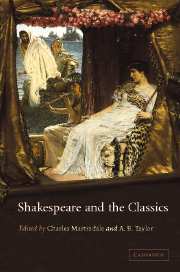Book contents
- Frontmatter
- Contents
- Notes on contributors
- List of abbreviations
- Introduction
- PART I AN INITIAL PERSPECTIVE
- PART II ‘SMALL LATINE’
- 2 Petruchio is ‘Kated’: The Taming of the Shrew and Ovid
- 3 Ovid's myths and the unsmooth course of love in A Midsummer Night's Dream
- 4 Shakespeare's learned heroines in Ovid's schoolroom
- 5 Shakespeare and Virgil
- 6 Shakespeare's reception of Plautus reconsidered
- 7 Shakespeare, Plautus, and the discovery of New Comic space
- 8 ‘Confusion now hath made his masterpiece’: Senecan resonances in Macbeth
- 9 ‘These are the only men’: Seneca and monopoly in Hamlet 2.2
- PART III ‘LESSE GREEK’
- PART IV THE RECEPTION OF SHAKESPEARE'S CLASSICISM
- Select bibliography (compiled by Joanna Paul)
- Index
4 - Shakespeare's learned heroines in Ovid's schoolroom
Published online by Cambridge University Press: 22 September 2009
- Frontmatter
- Contents
- Notes on contributors
- List of abbreviations
- Introduction
- PART I AN INITIAL PERSPECTIVE
- PART II ‘SMALL LATINE’
- 2 Petruchio is ‘Kated’: The Taming of the Shrew and Ovid
- 3 Ovid's myths and the unsmooth course of love in A Midsummer Night's Dream
- 4 Shakespeare's learned heroines in Ovid's schoolroom
- 5 Shakespeare and Virgil
- 6 Shakespeare's reception of Plautus reconsidered
- 7 Shakespeare, Plautus, and the discovery of New Comic space
- 8 ‘Confusion now hath made his masterpiece’: Senecan resonances in Macbeth
- 9 ‘These are the only men’: Seneca and monopoly in Hamlet 2.2
- PART III ‘LESSE GREEK’
- PART IV THE RECEPTION OF SHAKESPEARE'S CLASSICISM
- Select bibliography (compiled by Joanna Paul)
- Index
Summary
The dramatic action of A Midsummer Night's Dream begins when an angry father hauls his young daughter before the Duke of Athens to stage a trial of her modesty. In a scene Shakespeare will repeat and vary throughout his dramatic career, the young woman is pressed into public speech before the masculine authorities most likely to bind her tongue. Hermia has refused to marry the man chosen by her father, Egeus, who consequently invokes ‘the ancient privilege of Athens’ (1.1.41), a death penalty granted to the fathers of disobedient daughters. In a memorable piece of dialogue, Duke Theseus explains to Hermia the political theory behind Egeus' prerogative:
To you your father should be as a god,
One that composed your beauties, yea, and one
To whom you are but as a form in wax,
By him imprinted, and within his power
To leave the figure or disfigure it.
(1.1.47–51)Constitutionally bound to uphold a law that he ‘by no means … may extenuate’ (1.1.120), Theseus counsels Hermia on her duty to her godlike father.
He animates his lesson with an arresting rhetorical figure of a waxen form in an artist's shaping control. As a trope for the pressures that men exert over women, the image comes to Shakespeare's play in the first instance from the printing press and in the second from Ovid's tale of Pygmalion, where it describes the sensation felt by the sculptor-turned-lover when his ivory statue becomes flesh.
- Type
- Chapter
- Information
- Shakespeare and the Classics , pp. 66 - 86Publisher: Cambridge University PressPrint publication year: 2004
- 7
- Cited by



